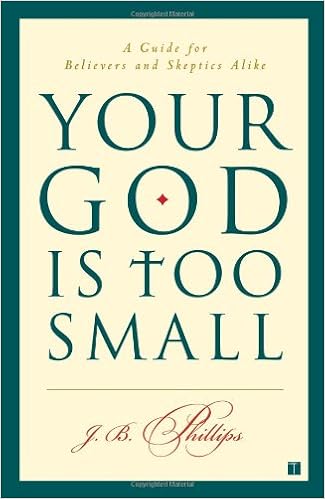When you think of Jesus, what comes to your mind?
A lightly tanned man with a sculpted beard and long flowing locks of hair that would make Fabio jealous? Bright piercing blue eyes that see your soul? Is he holding a lamb or gazing at the sky?

https://adam4d.com/which-jesus/
We tend to think of Jesus as sweet or meek and mild. In Your God Is Too Small, author J.B Phillips says this about a meek and mild god:
“This word “mild” is apparently deliberately used to describe a man who did not hesitate to challenge and expose the hypocrisies of the religious people of His day: a man who had such “personality” that He walked unscathed through a murderous crowd; a man so far from being a nonentity that He was regarded by the authorities as a public danger; a man who could be moved to violent anger by shameless exploitation or smug complacent orthodoxy; a man of such courage that He deliberately walked to what He knew would mean death, despite the earnest please of well meaning friends.
“Jesus Christ might well be called “meek,” in the sense of being selfless and humble and utterly devoted to what He considered right, whatever the personal cost; but “mild,” never!”
PG 27
“He taught men not to sit in judgment upon one another, but He never suggested that they should turn a blind eye to evil or pretend other people were faultless. He Himself indulged no roseate visions of human nature: He “knew what was in man,” as St. John tersely puts it.”
“To speak the truth was obviously more important than to make His hearers comfortable: though, equally obviously, His genuine love for men gave Him tact, wisdom and sympathy. He was Love in action, but He was not meek and mild.”
PG 29-30
I want you to look at the Old Testament, and every time you see “the angel of the LORD,” put Jesus’ name there. That’s pre-incarnate Jesus.
He saved Hagar and Ishmael, told Abraham not to sacrifice Isaac, and spoke to Moses from the burning bush.
Jesus met Balaam with a sword in his hand. The donkey had the sense to stop.
Jesus blessed Jael for driving a spike through an enemy’s head.
As Commander of Yahweh’s army, he met Joshua and told him he was not on the side of Israel when Joshua asked whose side he was on. Jesus said he’s all about the Kingdom of God.
Jesus spoke to young Samuel before he became the mighty prophet and judge that anointed Saul and David.
In 1st Kings, he brought Elijah food and told him to prophesy against Ahab.
Later, the Assyrians had Jerusalem surrounded, and it looked like Jesus killed 185,000 soldiers one night, as chronicled in 2nd Kings.
Zechariah had Heaven’s riders reporting to Jesus, who prayed for mercy on Israel, rebuked Satan, and restored the current High Priest.
That’s the Old Covenant, you may think. But, Hebrews 13:8 says, “Jesus Christ is the same yesterday, and today, and forever.“
There is an important thing to remember: Jesus is God of the Son. Therefore, he can administer justice in ways we cannot, like with 185,000 soldiers.
I looked at Jesus in the book of Luke. What kind of man was he emotionally, relationally, spiritually, and self-identity?
Emotionally
Jesus’ forty-day fast in the desert while facing down Satan shows his resilience and self-control. We get hangry if we miss more than one meal.
Jesus boldly and consistently confronted spiritual evil. One time he stared down 1,000 demons at one time.
Yet he’s also gentle with the broken and humble. In the Gospel of John, he cried at his friend’s tomb. Then he shouted at him to stop being dead and come out.
When people are being foolish, Jesus will be firm (Luke 9). He yelled at a synagogue leader who told people not to come to be healed on the Sabbath. That’s like Jesus yelling at your pastor.
When King Herod Antipas wanted to kill Jesus, messengers came to tell him. Jesus told them to say to him it’s not his time to die.
Yet, Jesus laments over Jerusalem’s hard-heartedness. He gives second chances to people, even those considered society’s dregs.
Jesus mourns unrepentance.
We see his self-control when he’s arrested. Jesus is holding back. He could have stopped it with ease. Instead, Heaven’s army is at his beck and call, if he doesn’t handle them like the 185,000.
Then at the trial, he kept his composure and forgave personal offenses.
Jesus was self-assured, self-controlled, and in touch with his emotional side. But he wasn’t driven by it.
Relationally
Jesus helps those who ask for help and those who don’t. If some interrupted him while he was in a hurry, he’d help them too. He prioritized people and elevated women.
When culture saw kids as an inconvenience, he loved and blessed them, rebuking his disciples who saw them as a bother.
Jesus didn’t show partiality.
When verbally challenged, he’d respond with questions, his responses deliberate and cunning, turning the tables on his adversaries.
Jesus would entertain questions if the crowd could learn from them but would call out his questioners for what they were (Luke 20). He used teaching moments but also raised his voice in correcting moments. But not always. At times, he corrected with an analogy.
Jesus raised his voice with a group of self-righteous Pharisees. Still, at dinner with an arrogant, ungracious member of the group, he quietly put him on blast.
Jesus knew he was divisive. He offended the righteous moralists by eating with the bad and was honest with the sinners about them being sinners.
Jesus would raise his voice, warn people, and call people out as bad examples when explaining things.
Once, he was invited to dinner. While there, he healed a man, then told everyone how they could be better, humble themselves, and invite those who couldn’t return the favor.
Jesus was upfront and transparent about the cost of following him. He wouldn’t stay where he wasn’t welcome.
Could we get away with this? Yelling at people, calling it like it is—that sounds fun.
Let’s look at the spiritual side of Jesus and see part of the reason he could do that.
Spiritually
Jesus understood the whole of Scripture and its application of it. He used quotes from it as counterattacks when tempted. He also prayed before big decisions and made time to rest and spend time with God.
He gave glory to God, not seeking it for himself. Because of this, God glorified him.
Jesus knew who he was, whose he was, and put it out there. He set boundaries and wouldn’t compromise the mission. Jesus drew a line in the sand, saying you’re either with him or against him (Luke 11).
Then he gave his life to save us, giving everyone a lifetime of chances to come to him as savior and King. Jesus died for friends and enemies alike.
Three days later, he got up and walked out of the tomb. He was done being dead.
I don’t know about you, but I’ll stay on his side. As we’ve seen, when I stray, he has no issue with correcting me before restoring me.



